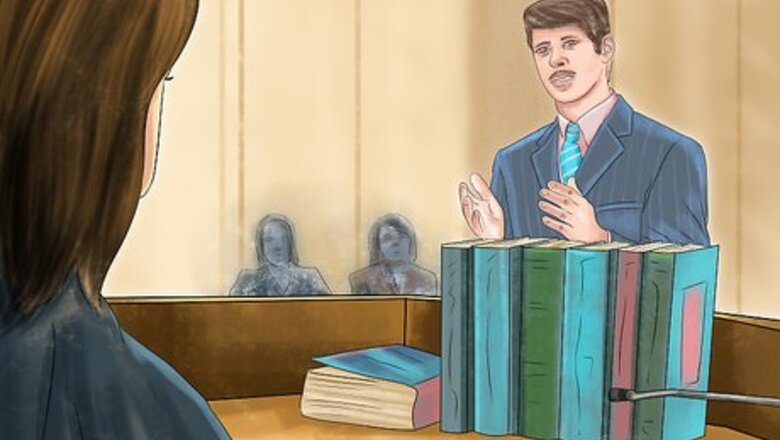
views
Getting a Lawyer
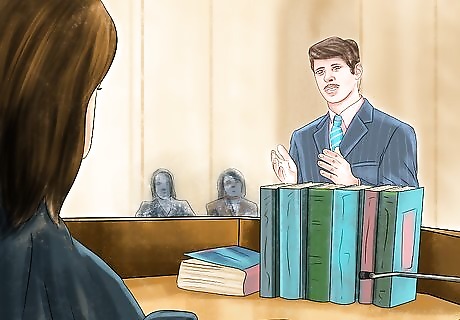
Appreciate the importance of having a lawyer represent you. Under almost all criminal proceedings, you are entitled to be represented by a lawyer (exceptions include civil forfeiture cases in municipal court, and in some jurisdictions, first offense DUI cases). Criminal defense lawyers are experts in resolving cases as efficiently and favorably as possible. A criminal defense attorney will be experienced in plea negotiations, and will likely have a professional relationship with the prosecution and judge. A local defense attorney will also have a better understanding of how prosecutors in your area approach plea bargaining. A criminal defendant's right to be represented by an attorney is so valuable that it is guaranteed by the Sixth Amendment to the United States Constitution. Although you can choose to represent yourself without a lawyer's assistance, you may place yourself at a severe disadvantage by doing so.
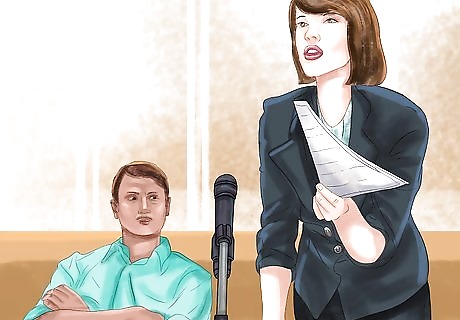
Consider having a public defender represent you. All criminal defendants have a right to be represented by a lawyer, even if they cannot afford to hire one. If you cannot afford a lawyer, the court will appoint a public defender to represent you. (In some counties, a private defense attorney may be appointed instead, at no cost to you.) Although public defenders are government employees, they owe all of the same duties of confidentiality, loyalty, and competence to their clients a private defense attorney would. If you request a public defender, you may not meet that public defender until right before your arraignment. Sometimes that public defender will only handle arraignments, and you will be assigned a second public defender for the remainder of the process.

Consider a private defense attorney. If you are in jail and cannot search for or interview attorneys yourself, have a friend or family member help you with the hiring process. When hiring an attorney, remember that almost anything you say to the attorney during your consultation is confidential, so be completely candid about your case. Don't discuss your case with family members, police, cellmates, friends, business colleagues, or prosecutors outside of the presence of your attorney. Anything you say to your spouse is privileged, but little else is, and almost anyone else can be compelled to testify against you. Ask for referrals. Many attorneys find a significant portion of their clients through referrals and word-of-mouth. Ask friends and family members to recommend a criminal defense attorney they trust. If you know an attorney who does not practice criminal defense, he or she may be able to refer you to a trusted colleague who does. Find certified criminal law specialists through your state bar's website. Each state has a "state bar," which is a governmental office that oversees attorneys practicing law in the state. Some attorneys are certified as specialists in their particular practice area by their state bar. Visit your state bar's website and search for certified criminal law specialists. The website will list the attorneys' contact information. Utilize referral services through your local or county bar association. Contact your local bar association and ask they operate a referral service. Most services operate by interviewing potential clients about their legal issues, and then match them to a lawyer with experience in that area of the law. There is usually a small charge for the initial consultation with the lawyer. Search online. You can use websites like Lawyers.com, Avvo, or even Yelp to locate and read client reviews for attorneys who specialize in criminal defense. Work out a fee arrangement. Some attorneys provide free consultations, while others charge a small fee. You can comparison-shop and consult with several attorneys before retaining one to work on your case. Some attorneys charge a flat rate for criminal representation, and others charge by the hour. Your attorney may be willing to accept alternative forms of payment, such as a car or something else of value.
Understanding the Stages of Criminal Prosecution
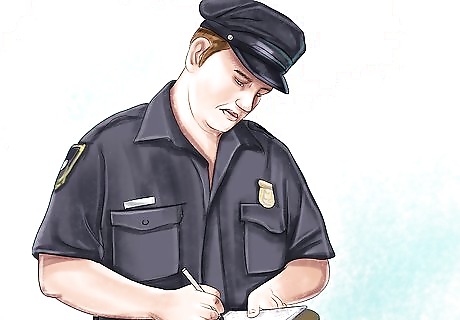
Be aware of what happens after an arrest. After you are arrested, the police will prepare a report and collect evidence. The police then submit the report to the prosecutor, commonly known as the "district attorney" in many jurisdictions. The district attorney represents the state and determines what charges they will bring against the defendant. The prosecutor reviews the police report and the evidence and decides whether to charge. If you are charged with a crime, an arraignment will be scheduled, and you will have the right to be represented by a criminal defense attorney who will defend you by fighting the prosecutor. The sixth amendment of the United States Constitution guarantees the right to a speedy trial. This means the prosecutor has to decide whether or not to bring charges against you within a reasonable amount of time. If time passes and they have not made a decision, you must be let go.
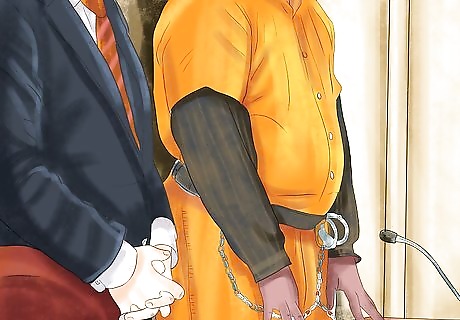
Enter a plea at your arraignment. An arraignment is typically your first court appearance. This is your first opportunity to enter a plea. The possible pleas are: Guilty. By pleading guilty, you agree to accept the punishment recommended punishment. Nolo contendere. Nolo contendere, also known as "no contest," is available in most states and indicates that you are not contesting the charges against you. This ends the prosecution. In misdemeanor cases, a guilty plea can be used against you as evidence of fault in a civil case, while a plea of nolo contendere cannot. In felony cases, guilty and nolo contendere are practically the same. Not guilty. If you plead not guilty, the prosecutor will prepare to take your case to trial. You can still accept a plea deal at a later stage of the prosecution. Double jeopardy/former judgment of conviction or acquittal. If another case was brought against you about the same incident, you may be protected from a second prosecution. Not guilty by reason of insanity. An insanity plea will require you to prove that you were not responsible for the incident for reasons of insanity. The prosecution will proceed, and you will need to assert an insanity defense at trial. You can still accept a plea deal at a later stage of the prosecution.
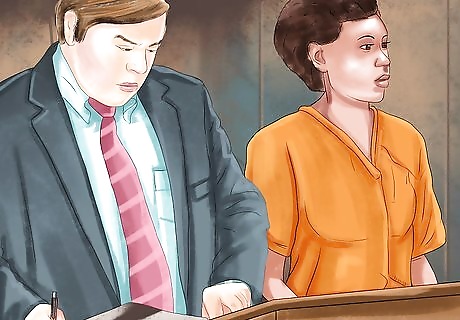
Follow the next stages of the case. If you plead "not guilty" at your arraignment, the prosecution will continue with its case against you. You can continue to engage in plea bargaining at any time during the next stages. Depending on how the case goes, you may get a better or worse deal later than the one you started with, or no deal at all. The next stages include: Discovery is the process whereby both sides in a case collect and exchange information in order to prepare for trial. Both sides will locate witnesses, get witness statements, and search for other evidence. Sometimes, one side will discover excellent supporting evidence; other times, a side will be unable to locate the evidence or witnesses they thought they would find. Motions are written requests that ask the court to resolve a dispute or direct the parties to do something. The outcome of each motion can influence plea bargaining. For example, a defense attorney may successfully argue a motion to have an important piece of evidence excluded from the prosecution's case. At the preliminary hearing, the prosecutor presents evidence and witnesses to establish that enough evidence exists to justify continuing with the trial. The defense can object to the introduction of evidence and prevent it from being used at trial. At the trial, the prosecution and defense will take turns trying to convince the jury (or the judge, if the defendant waives the right to a jury trial) that the you are guilty or innocent. At the end, the jury will deliberate before reaching a verdict. You can still engage in plea negotiations during breaks in the trial, and during the jury's deliberation. Once the jury returns its verdict, you will be sentenced.
Preparing for Plea Negotiations
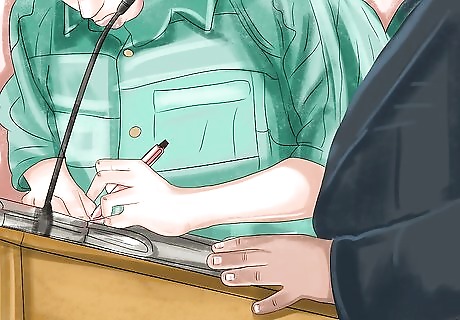
Know how plea bargaining works. Because courts and jails are overloaded and overcrowded, the prosecution will try to negotiate an agreement where the defendant pleads guilty in exchange for something else. Approximately 90% of criminal cases are resolved this way. If the two sides cannot reach an agreement, the case will go to trial. If the defendant is found guilty at trial, the punishment will most likely be much more severe than the plea deal that was offered.
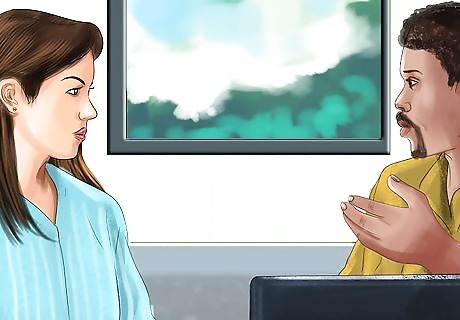
Rely on your attorney to handle plea negotiations. Your attorney has discretion to handle most aspects of your case in the way that he or she feels is best. However, the decision to accept or decline a plea deal is entirely your decision. Your attorney will negotiate for a plea deal on your behalf. Whenever the prosecution makes an offer, your attorney will discuss the offer with you.
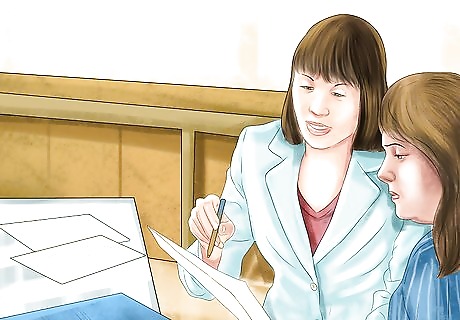
Find out what kind of plea deal to expect. There are several ways you and your attorney can find out what kind of punishment is typical in your jurisdiction in cases like yours. Gather as much information as you can at the beginning of your case. This should give you a good starting place in your negotiations and educate you on how to differentiate between a good deal and a bad deal. Find out the "standard deal." If your type of case is common, your attorney may already know what kind of standard deal to expect from the prosecutor. If your attorney is not sure what standard deal to expect, he or she can speak with other defense attorneys and the public defender's office for more information. Review the sentencing guidelines. Courts use sentencing guidelines, which provide recommended punishments for crimes. Judges and prosecutors may refer to the guidelines, but are not required to follow them. Your state's sentencing guidelines may be available online or through the court. Learn about your judge. Your attorney may know, or may be able to find out from other attorneys, about your judge's reputation. If your judge is known to be lenient in cases like yours, the prosecution may accept a more favorable deal than if the judge has a "get-tough" reputation. Ask the judge for an indicated sentence. In some states, your attorney can ask the judge for an "indicated sentence" at the arraignment. The judge will tell you what punishment you will receive if you plead guilty right away.

Analyze the strengths and weaknesses of your case. Your attorney will be analyzing the aspects of the case that the prosecution will need to prove, and the likelihood that each aspect will be proven, based on the available evidence and witnesses. The prosecution should offer you a more favorable plea bargain if it appears that they will have trouble proving their case against you. The aspects that the prosecution needs to prove are called the "elements" of the crime. For example, a common definition of robbery includes five elements: (1) the taking, with the intent to steal, of (2) the personal property of another (3) from his or her person or in their presence (4) against his or her will (5) by violence, intimidation or the threat of force. You can find the elements of a crime by referring to your state's penal code, which may be available online.
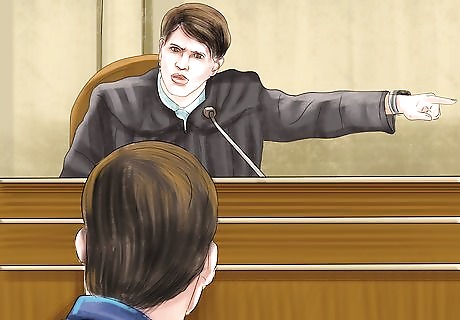
Consider possible outcomes in advance. Prior to beginning to plea bargain, you should consider the possible outcomes and what results you might be willing to accept. The possible outcomes of plea bargaining include: Dismissal. If the prosecution believes that they are not likely to win the case, they may agree to dismiss the case. Reduced charges. The prosecution may be willing to reduce the charge against you to a less serious offense, which carries a reduced punishment. For example, speeding tickets are often reduced to "failure to obey a regulatory sign." Some charges might be dropped altogether in exchange for your pleading guilty to the remaining charges. Lighter sentence. Most crimes have a minimum and maximum sentence. In exchange for your cooperation, the prosecution may be willing to recommend that the judge impose a lighter sentence than you would normally receive. As a condition on any plea deal, the prosecution may ask you to do something that will help the prosecution in this case or in another. You may be asked to testify against a co-defendant or work as a confidential informant in exchange for a plea deal. Another common condition is the requirement that you waive your right to appeal the conviction. You may still be able to appeal an unfair sentence, depending on the law in your jurisdiction and the facts of your case. Discuss the risks of waiving your right to appeal with your attorney before accepting a plea deal. Be aware that the prosecution and judge will try to reward you for accepting a plea deal early in the process. If you do not accept a deal when it is offered, you may not receive as good of an offer in the future, and if your case goes to trial, you may still receive the maximum sentence.
Negotiating a Plea Deal
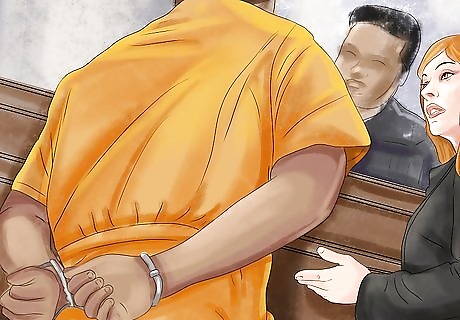
Negotiate with the prosecutor. Once you and your attorney have a firm understanding of the what deals the prosecutor is likely to offer, what deals you would be willing to accept, and the strengths and weaknesses of your case, it is time for your attorney to contact the prosecutor. He or she can call the prosecutor's office or arrange to meet in person. The prosecutor may also take the initiative and contact your attorney first. Your attorney should be prepared to argue the strengths and weaknesses of the case. Prosecutors typically handle many cases at once, and may need to be reminded of the details. Your attorney will want to remind the prosecutor which elements of the charged offenses will be difficult to prove. During plea negotiations, you and your attorney will likely learn new information about the prosecution's case. Be prepared consider new information and adjust your expectations for the outcome.
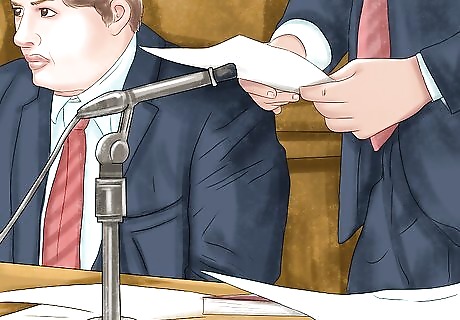
Consider a plea deal offered by the prosecution. At the conclusion of each meeting or discussion, the prosecutor should have presented a plea deal for you to consider. Your attorney will explain the terms of the deal to you, and may advise you on whether the deal is good or bad. When considering whether or not to accept a deal offered by the prosecution, keep the following in mind: Be realistic. If your case is weak, don't expect a dismissal or a great plea deal. Sometimes, the best choice is to admit guilt, accept the punishment, and move on as quickly as possible. Be flexible. If the prosecutor offers a plea deal that isn't as good as you had hoped for. It may make sense to accept the deal anyway instead of rejecting it and hoping you get a better offer later. Don't give in too quickly. Plea bargaining is a negotiation. Prosecutors often "overcharge" with more offenses or more serious offenses than they reasonably believe they can prove. They can then reduce or drop some charges to make a plea bargain more attractive. Overcharging is supposed to intimidate you into accepting a deal quickly. Remain calm and let your attorney evaluate whether you have been overcharged. Propose alternatives. You can suggest alternative punishments, such as probation and diversion programs or classes. With many rehabilitation programs, the crime will be expunged from your record upon completion.
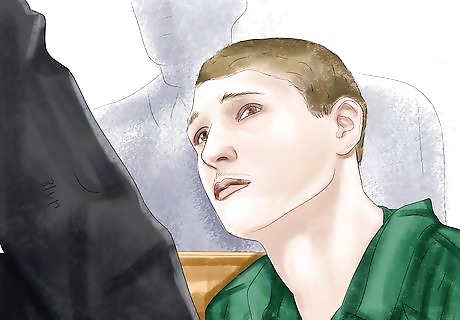
Consider moving forward with the case. You and your attorney may decide that the deal offered by the prosecution is not good enough. In that case, you should consider moving forward to the next stages of your case. Remember, you can continue to engage in plea bargaining at any stage in the case, up until the jury delivers a verdict after trial. The prosecution may offer a better deal in the future after your defense attorney wins an important motion, or after the prosecution fails to locate enough evidence or witnesses during discovery. Nothing you or your attorney says during plea bargaining can be used as evidence against you if you do not eventually plead guilty, or if you withdraw a guilty plea. If plea negotiations fail, nothing you said can be used against you in trial.
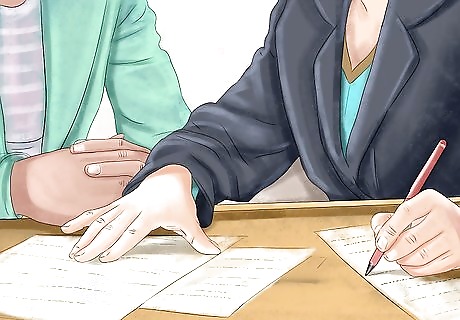
Review the written plea deal. Before the plea deal is submitted to the judge, it will need to be put into writing by the prosecutor. Review the written plea agreement with your attorney and verify that it is accurate and complete.
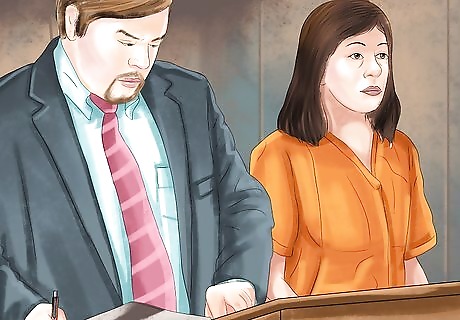
Submit the plea deal to the judge. The prosecution and defense will present the proposed plea deal to the judge in open court. The judge will then evaluate the plea deal, and may reject it if the punishment does not fit the crime. The judge will also ask you questions to verify that you understand and agree to the plea deal. In evaluating the deal, the judge will consider: The seriousness of the charges Your character and past conduct You prior criminal record, if any The facts of the case The interests of the victim and the general public



















Comments
0 comment